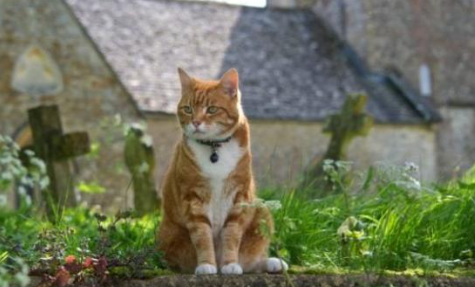Cats have captivated humanity for millennia, revered for their grace, independence, and enigmatic personalities. Throughout history, these furry companions have held a special place in many cultures, including featuring prominently in biblical stories. For those seeking a name steeped in faith and rich with meaning, the Bible offers a treasure trove of possibilities for your feline friend.
This comprehensive guide delves into the world of Bible cat names, exploring the origins, meanings, and fascinating stories behind these names. We’ll unveil a delightful selection of names for both male and female cats, categorized by their significance and drawing connections to biblical characters, places, and themes.

The Allure of Biblical Cat Names
There’s something undeniably special about bestowing a biblical name upon your cat. These names carry the weight of history and tradition, often holding symbolic meaning that reflects the qualities you admire in your feline companion. Whether it’s the strength of a mighty warrior, the wisdom of a prophet, or the unwavering faith of a biblical figure, a biblical name can create a unique bond between you and your cat.
Navigating the Biblical Landscape: A Guide to Choosing the Purrfect Name
The Bible is a vast and rich tapestry woven with stories of heroes, villains, everyday people, and of course, captivating locations. When embarking on your quest for the perfect biblical cat name, consider these factors:
- Meaning: Explore the meaning behind the name. Does it resonate with your cat’s personality or the qualities you wish to nurture?
- Sound: Opt for a name that rolls off the tongue easily and is clear for your cat to recognize. Consider both long and short options, depending on your preference.
- Uniqueness: While classic biblical names hold timeless appeal, you might seek a less common choice.
- Character Connection: Does a particular biblical character embody traits you admire in your cat?
A Journey Through the Bible: Unveiling Heavenly Names for Your Cat
For the Regal and Graceful Feline
- Leah (Female):Meaning “weary” or “cow,” Leah, the first wife of Jacob, is known for her patient and enduring spirit.
- Esther (Female): Meaning “star,” Esther, the brave queen who saved the Jewish people, embodies courage, loyalty, and unwavering faith.
- Rachel (Female): Meaning “ewe,” Rachel, Jacob’s beloved wife, represents beauty, compassion, and devotion.
- Seraph (Unisex): Referencing the six-winged celestial beings, a seraph signifies purity, protection, and divine love.
- Gabriel (Male): Meaning “God is my strength,” Gabriel, the archangel who announced the birth of Jesus, embodies power, protection, and a connection to the divine.
For the Spirited and Adventurous Cat
- Deborah (Female): Meaning “bee,” Deborah, a fierce prophetess and judge, represents leadership, bravery, and a warrior spirit.
- David (Male):The shepherd boy who became a mighty king, David signifies courage, resourcefulness, and unwavering faith.
- Caleb (Male): A faithful Israelite spy, Caleb embodies unwavering loyalty, courage, and a pioneering spirit.
- Reuben (Male): The eldest son of Jacob, Reuben signifies strength, protectiveness, and a sense of adventure.
- Aquila (Male): A tentmaker who befriended Paul the Apostle, Aquila represents resourcefulness, adaptability, and a willingness to explore.
For the Gentle and Wise Cat
- Ruth (Female):A loyal Moabite woman who followed her mother-in-law Naomi to Israel, Ruth exemplifies kindness, faithfulness, and unwavering devotion.
- Solomon (Male): The renowned king known for his wisdom and justice, Solomon embodies intelligence, discernment, and a peaceful demeanor.
- Anna (Female): A prophetess who recognized Jesus as the Messiah, Anna represents wisdom, piety, and a gentle spirit.
- Naomi (Female): Meaning “pleasantness,” Naomi embodies resilience, faith, and a quiet strength.
- Dove (Unisex): Referencing the symbol of peace and the Holy Spirit, a dove signifies gentleness, purity, and a calming presence.
Beyond the Names: Exploring Biblical References to Cats
While cats are not explicitly mentioned very often in the Bible, there are a few intriguing references that shed light on their perception in ancient times.
Beyond the Names: Exploring Biblical References to Cats
While cats are not explicitly mentioned very often in the Bible, there are a few intriguing references that shed light on their perception in ancient times.
- Proverbs 30:29: This verse mentions a “creeping thing, which goeth forth upon the earth; which hath no hands, yet it gathereth itself food.” While not explicitly naming a cat, some scholars interpret this as a reference to a small feline predator, possibly a wildcat, highlighting their stealth and hunting prowess.
- Isaiah 66:17: This verse mentions those who “sanctify themselves and make themselves clean… to eat swine’s flesh, and the abomination, and the mouse, and the turtle, all of them together: they shall be consumed, saith the LORD.” Here, the mouse is grouped with unclean animals, suggesting that cats, as natural predators of mice, might have been seen as beneficial creatures for pest control.
Symbolic Meanings: Unveiling the Hidden Language of Cats in the Bible
Although not directly mentioned, cats can be linked to various symbolic meanings within the Bible:
- Protection: In ancient Egypt, a civilization with close ties to the Hebrews, cats were revered as protectors, often associated with the goddess Bastet. This association might have influenced the perception of cats among the Israelites.
- Independence: The solitary nature of cats aligns with themes of individuality and self-reliance found in the Bible.
- Cunning and Resourcefulness: The Bible mentions various cunning characters who outwit their opponents. Cats, with their keen senses and stealthy movements, can be seen as embodying similar qualities.
Unveiling Heavenly Monikers: A Celebration of Place Names
The Bible is not just a collection of stories; it also details a rich geographical landscape. Here are some captivating place names that can inspire unique and meaningful cat names:
- Eden (Unisex): The idyllic garden where humanity began, Eden represents paradise, innocence, and a sense of sanctuary.
- Canaan (Unisex): The promised land flowing with “milk and honey,” Canaan signifies abundance, prosperity, and a place of fulfillment.
- Zion (Unisex): Referencing Jerusalem, the holy city, Zion signifies sanctity, hope, and a connection to the divine.
- Carmel (Unisex): Meaning “garden” or “vineyard,” Carmel evokes peace, abundance, and a place of flourishing life.
- Sharon (Female): A fertile coastal plain, Sharon signifies beauty, fertility, and a place of peace and prosperity.
Unveiling the Depths of Meaning – Biblical Cat Names
| Name | Gender | Meaning | Significance |
|---|---|---|---|
| Leah | Female | Weary, Cow | Patience, Endurance |
| Esther | Female | Star | Courage, Loyalty, Faith |
| Rachel | Female | Ewe | Beauty, Compassion, Devotion |
| Seraph | Unisex | Burning Ones | Purity, Protection, Divine Love |
| Gabriel | Male | God is my Strength | Power, Protection, Divine Connection |
| Deborah | Female | Bee | Leadership, Bravery, Warrior Spirit |
| David | Male | Beloved | Courage, Resourcefulness, Faith |
| Caleb | Male | Dog | Loyalty, Courage, Pioneering Spirit |
| Reuben | Male | Behold, a Son | Strength, Protectiveness, Adventure |
| Aquila | Male | Eagle | Resourcefulness, Adaptability, Exploration |
| Ruth | Female | Friend | Kindness, Faithfulness, Devotion |
| Solomon | Male | Peaceable | Intelligence, Discernment, Peaceful Demeanor |
| Anna | Female | Grace | Wisdom, Piety, Gentle Spirit |
| Naomi | Female | Pleasantness | Resilience, Faith, Quiet Strength |
| Dove | Unisex | – | Gentleness, Purity, Calming Presence |
| Eden | Unisex | Paradise | Innocence, Sanctuary |
| Canaan | Unisex | Promised Land | Abundance, Prosperity, Fulfillment |
| Zion | Unisex | Holy City | Sanctity, Hope, Divine Connection |
| Carmel | Unisex | Garden, Vineyard | Peace, Abundance, Flourishing Life |
| Sharon | Female | Plain | Beauty, Fertility, Peace, Prosperity |
Conclusion
The world of biblical cat names offers a rich tapestry of possibilities, allowing you to bestow upon your feline friend a name steeped in history, meaning, and symbolism. Whether you seek a name that reflects your cat’s personality, embodies a biblical virtue, or evokes a sense of place, the Bible provides a treasure trove of inspiration.
Unveiling the Mystery: A Look at Felines in Ancient Cultures
The Bible offers a glimpse into the lives and beliefs of the ancient Hebrews, but to gain a more comprehensive understanding of cats in the region, we must explore the wider tapestry of surrounding cultures.
- Egypt: Undoubtedly the most significant cat-loving civilization with deep ties to the Israelites. Cats were revered as divine beings, associated with the goddess Bastet, protector of the home and the harvest. Egyptian art depicts cats with grace and respect, highlighting their role as companions and pest controllers.
- Mesopotamia: The cradle of civilization in Mesopotamia also held cats in high regard. Early depictions show cats hunting alongside humans, suggesting a more practical partnership. Later, cats were linked to specific deities, such as Ishtar, the goddess of love and war.
- Persia: The Persians, known for their luxurious lifestyle, also appreciated cats. They bred specific breeds, like the Persian Longhair, and considered them symbols of grace and nobility.
The Legacy of the Feline: Cats Throughout History
The reverence for cats in these ancient cultures extended beyond the Bible, leaving a lasting impact on the perception of felines throughout history:
- The Middle Ages: While some superstitions demonized cats, others recognized their value as mousers. Seafaring cultures also valued cats for their rodent-hunting skills on ships.
- The Renaissance: Cats regained popularity as companions for the wealthy and intellectual classes. Artists began to depict cats in a more realistic and endearing light.
- The Modern Era: Today, cats are one of the most popular companion animals globally. Their independent nature, playful spirit, and undeniable cuteness have captured the hearts of millions.
FAQs: Frequently Asked Questions About Biblical Cat Names
- Are there any negative connotations associated with biblical cat names?
The Bible primarily portrays animals symbolically. While some interpretations might assign negative connotations to certain creatures, most biblical cat names can be seen in a positive light. However, it’s always wise to research the specific meaning behind a name before choosing it for your cat.
- Can I use a name from the New Testament for my cat?
Absolutely! While the Old Testament features more prominent references to places and characters, the New Testament also offers inspiring names. Consider names like Luke, Peter, or Mary, all associated with significant figures in the Christian faith.
- What if I can’t decide on just one name?
Many cat owners choose a longer formal name and a shorter nickname for everyday use. This allows you to appreciate the full meaning of the biblical name while having a convenient option for calling your cat.
Additional Resources
- The International Cat Association (TICA): https://www.tica.org/
- The National Geographic: Cats in Ancient Egypt: https://www.nationalgeographic.com/animals/mammals/facts/domestic-cat
- The American Society for the Prevention of Cruelty to Animals (ASPCA): https://www.aspca.org/
Remember, the most important factor in choosing a name for your cat is that you love it! With a little research and inspiration from the Bible and beyond, you can find the purrfect name for your furry friend.






